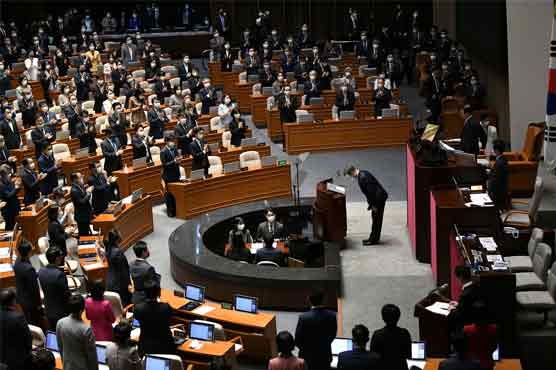South Korea parliament to pass law to curb 'fake news'

"This amendment would have the effect of discouraging the reporting of sensitive news."
SEOUL (Reuters) - South Korea s ruling party is set to revise a media law to rein in "fake news" by giving courts the power to award much bigger damages but opponents said it would discourage reporters from delving into the shady dealings of the powerful.
South Korea is home to a thriving news industry, ranking relatively high on world media freedom tables but it has struggled with the spread of misinformation and cyber bullying in recent years.
The amendment to the Act on Press Arbitration and Remedies allows the courts to order damages up to five times bigger than they can now for publication of false or fabricated reports ruled to have infringed on a plaintiff s rights or caused "emotional distress".
"The damage and ripple effect caused by wrong media reports is large and broad in scale, inflicting irreparable harm to individuals," the Democratic Party said in a statement.
The law would also require media outlets, including internet news service providers, to issue corrections for erroneous or fabricated news that manifest "intention" or "gross negligence".
The ruling party said the penalties were intended to put the burden of responsibility where it belonged for malicious or false reports and to minimise their emotional and material damage.
But critics, led by the opposition People Power Party, said the law would set the democratic clock back in the guise of protecting victims of fake news.
"News media that would otherwise not hesitate to report and write about illegal acts and shady affairs of those in power will be discouraged and beaten down, and the road to just society and a normal state will close," the opposition party spokeswoman said.
Parliament s legislation and judiciary committee passed the bill on Wednesday over opposition objections, clearing the last hurdle before it moves to the main chamber.
Ryu Je-hua, an attorney who specialises in media law and political cases, said the bill reflected a government aim to silence news organisations.
"This amendment would have the effect of discouraging the reporting of sensitive news," Ryu said.
South Korea, which ranks 42 of 180 countries on a World Press Freedom Index, has recently battled the spread of misinformation and cyber bullying.
The apparent suicide of two K-pop artists in 2019 put a spotlight on personal attacks and cyber bullying of vulnerable young stars.
In a poll by WinGKorea Consulting released on Tuesday, the bill had the support of 46.4% of the 1,024 respondents, while 41.6% said it would suppress press freedom.
Governments and companies worldwide are increasingly worried about the spread of false information online and its impact, while human rights activists fear laws to curb it could be abused to silence opposition.
The International Federation of Journalists (IFJ) last week said the South Korean bill relied on a "fundamental misunderstanding of fake news" and it threatened to create a climate of fear among Korean journalists.

